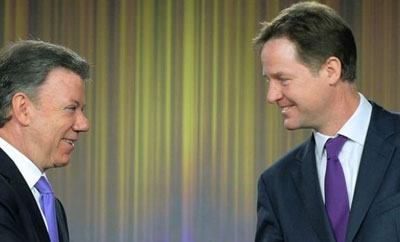The United Kingdom’s deputy prime minister has backed claims by Colombia’s president that the so-called “war on drugs” is not working, a sentiment echoed throughout the Americas that may pressure the United States into a drug policy rethink.
Regarding the US-backed “war on drugs,” President Juan Manuel Santos stated: “Unfortunately today we can say that we have not won it, despite the fact that Colombia has been the country, on one side, that has made the most sacrifices, has shed the most blood,” reported EFE. He noted that Colombia’s extensive experience combating the drug trade gives them a certain authority on the policy subject.
Santos has long questioned the current regime governing drug policy, stating in 2011 that he would accept legalization as a strategy if was necessary to “take away the violent profit that comes with drug trafficking.”
During a recent visit to Colombia, UK Deputy Prime Minister Nick Clegg backed Santos’ views, saying “nobody can say the world is winning the war against drugs” as he backed a new approach, reported El Tiempo.
InSight Crime Analysis
The addition of the United Kingdom — one of the United States’ principal global allies — to growing calls for drug policy reform in Latin America could represent a watershed moment in the debate if it hastens a policy shift by the United States. Already former Latin American presidents and other notable political figures have signed initiatives to change the United Nations Convention on Drugs, while members of the Organization of American States (OAS) have agreed to debate current policy, and Uruguay recently passed a law regulating marijuana production and sales. Calls for alternative approaches led the UN to program a 2016 special drug policy summit.
SEE ALSO: Coverage of Drug Policy
The United States has pumped billions into drug wars — with significant focus on Colombia and Mexico — that have resulted in thousands of deaths and human rights abuses without stemming the flow of narcotics. While the US has hailed Colombia as its shining example, so triumphant in this “war” it is now training and supplying other countries in the region, Santos’ comments highlight how an element of myth surrounds this success story. The country’s criminal landscape has changed, as have the key players, but criminal organizations like the Urabeños are still strong, violent and raking in hundreds of millions of dollars from the drug trade.
The United States has already begun to revise its own drug policy approach to focus on prevention and access to treatment, but as major partners continue to call for alternatives, the United States may be forced to take a more receptive and leading role in the global discussion.

